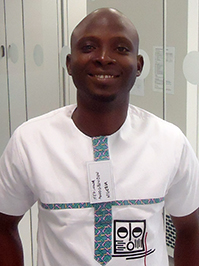Pilot project aims to understand the link between COVID-19 and Parkinson’s disease
 Postdoctorate fellow Dr. Ifeoluwa Awogbindin (Tremblay Lab; pictured) and Dr. Marie-Eve Tremblay will be coinvestigators on a new pilot project funded by Parkinson Canada’s 2022 Research Funding Competition.
Postdoctorate fellow Dr. Ifeoluwa Awogbindin (Tremblay Lab; pictured) and Dr. Marie-Eve Tremblay will be coinvestigators on a new pilot project funded by Parkinson Canada’s 2022 Research Funding Competition.
Together with award-recipient Dr. Thérèse Di Paolo (Laval) and Dr. Guy Boivin (Laval), Drs. Awogbindin and Tremblay will help investigate the relationship between COVID-19 and Parkinson’s disease (PD). Specially, they aim to understand whether COVID-19 will accelerate and/or exacerbate PD pathology, and if a particular sex could be more affected.
“There is a palpable worry about which future diseases might arise as an aftermath of a COVID-19 infection or from long COVID, and Parkinson’s disease is an eligible member on that list,” says Dr. Awogbindin. This research is particularly critical, he adds, as “an end-game is not yet in sight” for the COVID-19 pandemic and individuals, including those who are vaccinated multiple times, can be repeatedly infected with the virus.
Dr. Awogbindin says several clinical observations have shown COVID-19 severely affects the basal ganglia, a region of the brain that malfunctions during PD progression. The infection causes microglia in the region to severely adopt a reactive state called microglial nodules. In this state, the immune cells collect in numbers at several foci. Currently, there is minimal information about what their functions might be.
With this $75,000 Pilot Project Grant, the Tremblay Lab will contribute its unique expertise in microglial biology to generate preliminary data on the specific involvement of microglia during SARS-CoV-2 and COVID-19. They will also investigate whether the alterations to microglia are transient and determine the onset of future neurodegenerative diseases, such as PD, following exposure to environmental risk factors.
“Data from this study would shape our doubts concerning COVID-19 and the future development of PD,” says Dr. Awogbindin. “It may also offer a scaffold for future studies to investigate associations of other diseases following bouts of COVID-19, as well as for the development of drugs to mitigate such complications.”
Dr. Awogbindin previously discussed key insights on the implications of microglia during SARS-CoV-2 and COVID-19, considering how other related viruses manipulate the glial cells, in a first-author review article. Dr. Tremblay and Dr. Di Paolo were senior co-authors on that paper.
